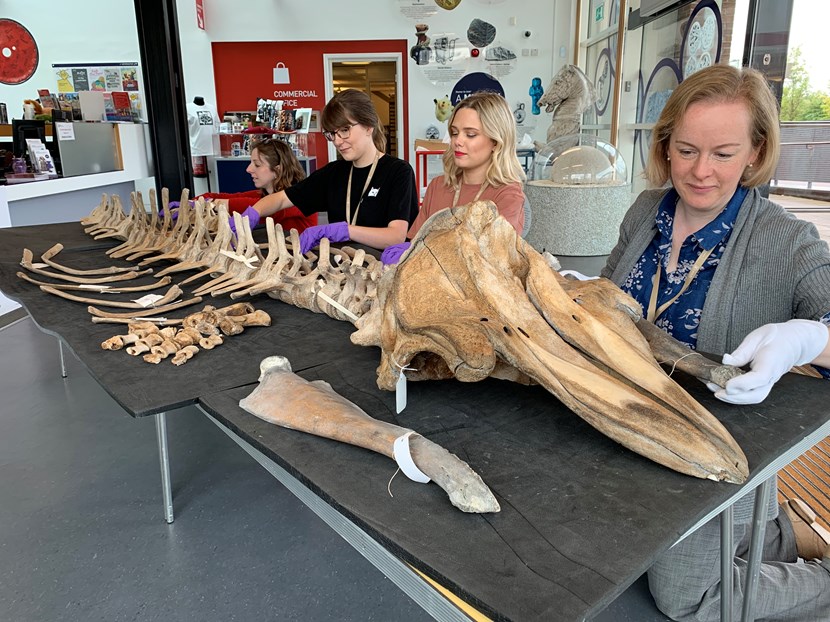
20 May 2019
Pilot project will piece together Leeds whale’s tragic tale
The skeleton of a majestic whale cruelly killed by fishermen 152 years ago will be reconstructed for a new display highlighting the plight of our planet’s oceans.
Leeds Museums and Galleries’ long-finned pilot whale is being painstakingly pieced together over the next few months before it is hung from the ceiling of Leeds City Museum later this year.
Currently in storage at the Leeds Discovery Centre, the ill-fated marine mammal was collected back in 1867 off the coast of Scotland when a group of fishermen spotted a pod of whales near Leith.
Deliberating stranding the animals, they killed the entire group for meat and blubber.
The whale has been in pieces in the museum store but with the help of funding from the Leeds Philosophical and Literary Society, the Friends of Leeds City Museums and the National Lottery Heritage Fund it will now be cleaned, conserved and articulated before being displayed to the public in the autumn.
Clare Brown, Leeds Museums and Galleries’ curator of natural sciences said she hoped the display would not only show how attitudes towards whales had changed, but also how much still needs to be done to protect other vulnerable species.
She said: “This whale met a very tragic and gruesome end which was sadly not unusual in 1867. In the century and a half that has followed, global conservation efforts have seen a huge shift in the way whales are seen and thankfully, we are now predominantly focussed on protecting and preserving these magnificent creatures.
“But the existence of many species living in our oceans remains precarious and it will take a similar change in attitudes to ensure not only their immediate survival but the long term sustainability of the marine ecosystem.
“Our hope is that by displaying this inspirational animal in Leeds and telling its story, we can encourage thousands of visitors to think about the environment in a different way and look at the many small steps they can take to become part of the fight to safeguard our seas.”
Found in the North Atlantic and Southern Hemisphere, long-finned pilot whales are named for their unusually long pectoral fins and the once prominent belief that groups had a leader, or “pilot”.
Reaching more than 6.5 metres in length and weighing more than five tonnes, they live in large groups of up to 150 and feed mostly on fish, communicating while they hunt with a series of characteristic clicks, whistles and buzzes.
Historically a target for the whaling industry, tens of thousands of long-finned pilot whales were captured and killed in the 1940s and 50s. Today, the Faroe Islands are home to the only remaining large scale long-finned pilot whale hunts in the world.
Once on display, the Leeds whale will be a permanent exhibit and will be used to kick-start a programme of workshops, discussions and talks by experts on whales and the sea.
The museum’s collection staff will also be running events on object conservation and whale anatomy, before the animal goes on display.
ENDS
For media enquiries, please contact:
Stuart Robinson
Communications Officer
Leeds City Council
Tel: 0113 378 9182 (please note my new number)
Email: stuart.robinson@leeds.gov.uk
About Leeds City Museum
Leeds City Museum, Millennium Square, Leeds, LS2 8BH
0113 378 5001
FREE admission
Facebook/Twitter/Instagram: LeedsCityMuseum
Leeds City Museum was established in 1819 and reopened on 13 September 2008, having moved to the former Mechanics’ Institute located on Millennium Square in the centre of Leeds. With four floors and six galleries to visit, the museum offers an exciting, fun and interactive day out for all the family. The museum collection spans ancient and contemporary history, the local area and the wider world. The museum’s temporary exhibition space hosts a changing programme of exhibitions.
The museum was named winner of the Kids in Museums ‘Family Friendly Museum of the Year 2018’. Family activities and school holiday events take place throughout the year including craft sessions at Rory’s Saturday Club, Tiny Tigers for under 5s and Museum Minis. The museum has dedicated conference and events spaces, with in-house catering provided by Leeds City Museum Café.
The Leeds natural science collection comprises around 800,000 specimens, and is hugely diverse in terms of subject area, specimen type, and taxonomic range. It is Designated as being of national and international significance. A portion of our collection is on display in the Life On Earth gallery at Leeds City Museum. You can see many of our specimens at Leeds Discovery Centre, on one of our free store tours.
For media enquiries contact:
Leeds City Council Communications team
communicationsteam@leeds.gov.uk